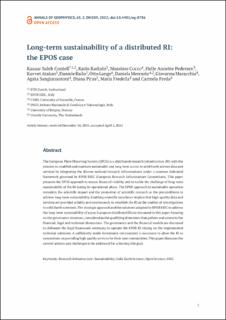Long-term sustainability of a distributed RI: the EPOS case
Contell, Kauzar Saleh; Karlzén, Karin; Cocco, Massimo; Pedersen, Helle Annette; Atakan, Kuvvet; Bailo, Daniele; Lange, Otto; Mercurio, Daniela; Maracchia, Giovanna; Sangianantoni, Agata; Piras, Diana; Fredella, Maria; Freda, Carmela
Journal article, Peer reviewed
Published version

Åpne
Permanent lenke
https://hdl.handle.net/11250/3057089Utgivelsesdato
2022Metadata
Vis full innførselSamlinger
- Department of Earth Science [1050]
- Registrations from Cristin [9791]
Sammendrag
The European Plate Observing System (EPOS) is a distributed research infrastructure (RI) with the mission to establish and maintain sustainable and long-term access to solid Earth science data and services by integrating the diverse national research infrastructures under a common federated framework governed by EPOS ERIC (European Research Infrastructure Consortium). This paper presents the EPOS approach to ensure financial viability and to tackle the challenge of long-term sustainability of the RI during its operational phase. The EPOS approach to sustainable operation considers the scientific impact and the promotion of scientific research as the preconditions to achieve long-term sustainability. Enabling scientific excellence implies that high-quality data and services are provided reliably and continuously to establish the RI as the enabler of investigations to solid Earth scientists. The strategic approach and the solutions adopted by EPOS ERIC to address the long-term sustainability of a pan-European distributed RI are discussed in this paper focusing on the governance structure, considered as the qualifying dimension that gathers and connects the financial, legal and technical dimensions. The governance and the financial models are discussed to delineate the legal framework necessary to operate the EPOS RI relying on the implemented technical solutions. A sufficiently stable investment environment is necessary to allow the RI to concentrate on providing high quality services for their user communities. This paper discusses the current actions and challenges to be addressed for achieving this goal.
